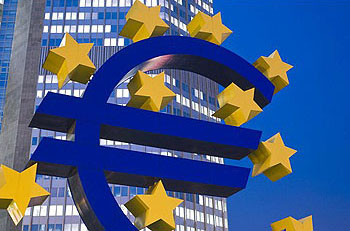As a general rule of thumb, any time you see an article about “Target 2,” it is important.
No, this is the not the next retail innovation following the invention of SuperTarget and Target Greatland. Target 2 is the clearing system for European banks, and for its first couple of years (it replaced the old system in 2007) it was every bit as boring as that sounds. But as you may recall, the core of the European financial crisis is a persistent imbalance in trade deficits, and the mirror image of a trade imbalance is a capital account imbalance. In other words, some countries are net exporters of money (Germany, France, the Netherlands) and some are net importers (Spain, Greece, Italy, etc.) During the boom years, commercial banks funded all these flows, but the music stopped playing on that game some time ago, and ever since then central banks have taken up the slack. In particular, the German central bank has become the funder of last resort to the ECB, which in turn is the funder of last resort to central banks in other countries.
And it turns out that the Germans are getting increasingly nervous about this. One solution — the one that would actually work — is to address the trade deficits at their root, which means also addressing Germany’s trade surplus. That’s not going to happen. Wolfgang Münchau picks up the story:
Instead, the Bundesbank prefers to solve the problem by addressing the funding side. [Jens Weidmann, president of the Bundesbank] proposed last week that Germany’s Target 2 claims should be securitised. Just think about this for a second. He demands contingent access to Greek and Spanish property and other assets to a value of €500bn in case the eurozone should collapse. He might as well have suggested sending in the Luftwaffe to solve the eurozone crisis. The proposal is unbelievably extreme.
It also tells us something else: by seeking insurance against a collapse of the euro, the Bundesbank tells us it no longer regards the demise of the euro as a zero-probability event. If the Bundesbank seeks insurance, so should everybody else.
Does this mean that Germany itself is no longer 100% committed to the euro, and in turn that the eurozone is eventually doomed? Maybe! Stay tuned, and keep your eyes peeled for further action on the Target 2 front.


















